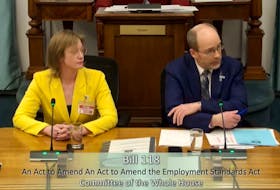Josh Dunn wanted the letter to admit that the province was wrong in trying to deprive him of six months of income.
But the Department of Community Services document that landed in his mailbox last Tuesday contained no explanation, only that $585 had been deposited in his bank account.
It took poverty-law lawyer Vince Calderhead, intervening on Dunn’s behalf, to get to the bottom of it. After two calls to Community Services he learned the department relented and allowed Dunn to keep 30 per cent of the $3,900 he had hoped to earn during a six-month film project. That $585 figure amounted to three months’ worth of back pay. He’s entitled to three more payments of $195
But Dunn, an income assistance recipient, believes he’s being shortchanged by the province and has appealed the department’s decision. He also was looking for something in writing from the department to explain its original decision to claw back his entire income as well as its most recent call to take less.
“I just want to be treated fairly and get the same wage any person on social assistance would get,” said Dunn. “I want to be treated like everyone else.”
Last summer, Dunn, who has cerebral palsy and other medical conditions, earned a $12,000 Arts Nova Scotia grant to make a film documenting the struggles disabled people face finding romance. In November, the department deemed the grant as self employement, allowing the province to clawback earnings at 100 per cent.
He shared his plight in the Nov. 21 edition of the Chronicle Herald. Two weeks later he received the Department of Community Service letter informing him he’s allowed to keep $195 from his monthly pay of $650.
But Dunn wants the department to allow him $450 a month, which he would be entitled to under the Employment Support and Income Assistance Regulations if the provincial government considered his salary regular wages.
Calderhead says Dunn has a case and that the department’s attempt to appease Dunn falls short.
“They’re calling the income a commission, like the department is just giving him a break. In all likelihood they’ve done that because the Herald story pointed out the facts that their approach leaves recipients with zero incentive to do anything.
“It’s a failure to take adequate steps to support people attempting to get off assistance. If you’re stuck on assistance you’re a person in need and then the reality is they need to be treating you properly. Here’s someone with a disability and they need to accommodate that.”
By appealing the department’s decision Dunn will be entitled to get a full explanation in writing for why the department decided to deprive him of income. But Calderhead says Dunn should be entitled to that information without going through a process that could last up to two months.
“Really, what we’re talking about here is fair procedure, to explain to him why it is they’ve done what they’ve done,” said Calderhead. “In a way that’s kind of high-handed, they’ve taken it upon themselves to do this and do it without providing him the rationale in writing.”
The department said that changes will be made to the regulations pertaining to self-employment early in the new year. Recipients categorized as self-employed would be permitted to earn some money but how much and the criteria for such a classification remains to be seen.
The department also does not have a policy of providing a written explanation to recipients when changes are made to their income assistance. But department spokeswoman Shannon Kerr said that caseworkers do attempt to reach recipients by phone.
“If attempts to reach a client by phone are unsuccessful, a letter is sent requesting the recipient to contact their caseworker so the explanation can be provided,” said Kerr. “Where many recipients utilize direct deposit, clients may receive payments ahead of the explanation. Our aim is to ensure that recipients have their payments as soon as possible. As always, we encourage any client who has questions about their income assistance to contact their caseworker.”
But Calderhead said this is simply bad practise and furthermore recipients are not automatically provided money to have a phone.
“There’s no provision made for a phone,” said Calderhead. “In my view, in every case send a letter at the time they’re making a decision to explain what it is they’re doing. That would allow the recipient to appeal if they disagreed with the decision but leaving it some kind of telephone black hole prevents recipients from being able to enforce their rights.
“The other part of that puts the onus on the client to contact them. When in reality they’re the ones that have made the change.”
In the end, Dunn hopes that his appeal results in the department changing the rules so to give every recipient an incentive to work and be a contributing member of society.
“I’m hoping that each case is looked at individually,” said Dunn. “Hopefully they’ll see people are doing their best and they want to be productive.”
RELATED









